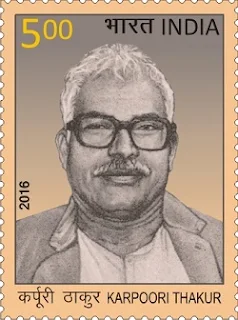Karpoori Thakur's political career was marked by a relentless commitment to social equality. As a leader of the downtrodden and marginalized, he worked tirelessly to dismantle caste-based hierarchies and promote social harmony. Thakur's advocacy for the welfare of the underprivileged earned him the moniker "Jan Nayak," meaning 'People's Leader.'
Karpoori Thakur played a crucial role in the political landscape of Bihar. He served as the Chief Minister of the state on multiple occasions, leaving an indelible mark on Bihar's socio-economic and political development. His leadership was characterized by a focus on grassroots governance and an unwavering dedication to the welfare of the common man.
Thakur's commitment to social justice found expression in the implementation of reservation policies during his tenure as Chief Minister. He introduced a groundbreaking decision to provide 15% reservation for the economically backward among the forward castes, ensuring that the benefits of affirmative action reached those who were historically excluded.
Karpoori Thakur recognized the economic disparities that plagued the marginalized communities. In a bid to address these imbalances, he introduced policies aimed at uplifting the economically disadvantaged sections of society. His vision was to create an environment where every citizen, regardless of their socio-economic background, could participate meaningfully in the state's progress.
Karpoori Thakur was a firm believer in the transformative power of education. During his tenure as Chief Minister, he implemented significant reforms in the education sector, aiming to make quality education accessible to all. Thakur's initiatives focused on expanding educational opportunities, especially for those who had historically been denied access.
Even after his passing in 1988, Karpoori Thakur's legacy continues to shape the political narrative of Bihar and beyond. His contributions to social justice and political reform are remembered and commemorated through various initiatives, awards, and events dedicated to preserving the ideals he stood for.
Karpoori Thakur's life and work serve as a guiding light for future generations of leaders and social reformers. His legacy underscores the importance of political leadership rooted in principles of equality, justice, and inclusive governance, offering a roadmap for building a more just and equitable society.
In conclusion, Karpoori Thakur's life was a testament to the transformative power of visionary leadership. His commitment to social equality, economic justice, and educational empowerment makes him a revered figure in the annals of Indian political history, leaving behind a legacy that continues to inspire and guide those who seek to build a more just and inclusive nation.

